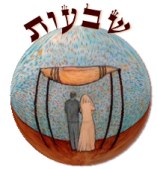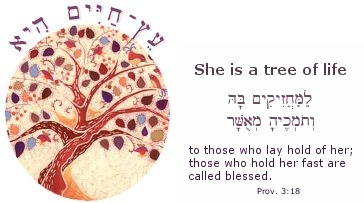|
|
|||||||||||||||||||||
 |
|||||||||||||||||||||
|
Learn Hebrew |
|||||||||||||||||||||
|
|
|
||||||||||||||||||||
 |
|
Anticipating Revelation |
|
The two-month wait is nearly over now, and we anticipate a time to recommit our lives to the LORD God of Israel. On Shavuot we are commanded to remember the revelation given at Sinai (Deut. 4:9) and to spiritually reenact kabbalat ha-Torah (the receiving of the Torah). This is symbolic of a wedding day, when God betrothed Israel as His own people, separate from all others. The goal of Passover redemption was to set us free to become God's own treasured people (ūóųĘūØ ūĪų░ūÆų╗ū£ų╝ųĖūö, am segulah), a light to the nations: ambassadors for Heaven's voice... According to some of the sages, the entire Jewish nation will one day be saved from their spiritual exile on Shavuot. As Messianic Jews, we likewise understand that our Passover redemption was designed by God to set us free to become appointed heirs (╬║╬╗╬ĘŽü╬┐╬Į╬┐╬╝╬┐╬╣) with Yeshua (Jesus) and to identify with His redemptive purposes in the earth (Rom. 8:17, Titus 3:7, etc.). By God's chesed we are now called God's own treasured people (ūóųĘūØ ūĪų░ūÆų╗ū£ų╝ųĖūö, am segulah), a light to the nations: ambassadors for the Kingdom of God (1 Peter 2:9). We have been saved from our spiritual exile when the Ruach Ha-Kodesh (Holy Spirit) was given to us (Acts 2). Shavuot begins on Sivan 6 on the Jewish calendar. In Jewish tradition, the second day of Sivan is called Yom Hameyuchas - the "Day of Distinction" - since it was on this day that God told the Israelites that He would make them into a kingdom of priests and a holy nation (Ex. 19:5-6). A three day period immediately following (Sivan 3-5) is called shelosh yemei hagbalah - the "three days of setting the boundary" (Ex. 19:12) - and represents a time of enhanced sanctity. The Jewish day begins at nightfall and on Erev Shavuot (Sivan 6) it is customary to stay up all night studying the Torah in order to instill a deep longing for God's revelation to be given. According to some sages, one who studies the first and last chapters of a book of the Tanakh is considered to have studied the entire book, and therefore the custom arose to read the first and last chapters of each book of the Bible on the first night of Shavuot. The study of the Ten Commandments and the Taryag Mitzvot (613 commandments enumerated by the sages) is also a common custom during this time. Since Shavuot recalls the momentous time when Israel received revelation from God at Sinai, at daybreak additional prayers and blessings are recited at the synagogue for the gift of the Torah (mattan Torah). However, since ignoring the Torah leads to ruin, admonition to pursue the study of Torah is also made during this time. Who is the man so wise that he can understand this? To whom has the mouth of the LORD spoken, that he may declare it? Why is the land ruined and laid waste like a wilderness, so that no one passes through? And the LORD says: "Because they have forsaken my law that I set before them, and have not obeyed my voice or walked in accord with it. (Jer. 9:12-13) Some of the sages have made a connection between the Ten Days of Repentance (the time between Rosh Hashanah and Yom Kippur) and the seven weeks of the Omer Count (the time between Passover and Shavuot). Studying God's revelation is a prelude to re-experiencing the joy of His Presence, though this of course requires diligence and hard work. In order to understand what God requires of us, then, we must make an honest effort to study the truth of Torah and to practice it in our lives. We therefore ask God to make Torah sweet on our tongues and to help us be "engrossed" in the words of the Scriptures. "The world exists because of the breath of the schoolchildren (Talmud Bavli Shabbat 119b) In Hebrew the word chinukh (ūŚų┤ūĀų╝ūĢų╝ūÜų░) means "education," a word that shares the same root as the word "chanukah" (ūŚų▓ūĀų╗ūøų╝ųĖūö, dedication). Unlike the ancient Greek view that pragmatically saw education as a humanistic means of escaping from "the cave of ignorance" to better one's personal power or happiness (Plato, the Sophists), the Jewish idea of education implies dedication to God and His concrete purposes on the earth. For example, the Rambam (Maimonides) notes that the word chinukh is borrowed from the Torah's description of dedicating a tool for use with the Holy Altar, "habituating the tool for its work." In other words, godly education is a process of being made a "fit vessel" for the service of God in the world. All other ends of knowledge ultimately exist for this purpose, and rightly understood, education is a form of worship. God said to the Jews, "I want to give you the Torah, but who will guarantee that you will obey its instruction?" The Jews replied, "The Patriarchs will be our guarantors." "Not good enough," said God. "They themselves owe Me...." "The prophets will be our guarantors." Again God responded, "Not good enough. They themselves owe Me...." "Our children will be the guarantor." "This is good guarantor!" (Midrash Tehilim/Shocher Tov 8) Torah learning is not an individual act. When we learn to "talk Torah" with each other as members of a community, we share the greater message of redemptive love that Yeshua gave to the world... Chaverim, pursue talmud Torah... Vision and Truth... ūæų╝ų░ūÉųĄūÖū¤ ūŚųĖū¢ūĢų╣ū¤ ūÖų┤ūżų╝ųĖū©ųĘūó ūóųĖūØ b'ein ┬Ę cha┬Ęzon ┬Ę yip┬Ępa┬Ęra' ┬Ę am "Where there is no vision, the people cast off restraint, |
|
A note about Isru Chag |
||||||||||||||||
|
The day following the closure of the Shavuot season is known as Isru Chag, "binding the festival" (from Psalm 118:27). It is observed as a semi-festive day, when the Tachanun supplications (normally recited after the weekday Amidah) are omitted from the morning and afternoon services. |
||||||||||||||||
|
The LORD is God; He has given us light; bind the festal offering to the horns of the altar with cords. |
||||||||||||||||
|
El Adonai yaiyaer lanu isru-chag, b'avotim ad-karnot ha-mizbe'ach. |
||||||||||||||||
|
During the Temple period, Isru Chag was the day when the pilgrims would leave Jerusalem for their journey back home. According to the Talmud, observing Isru Chag as a festive day is akin to offering sacrifices upon the altar in the Temple (Sukkah 25b). |
||||||||||||||||
|
Hebrew for Christians |
||||||||||||||||
|
||||||||||||||||




